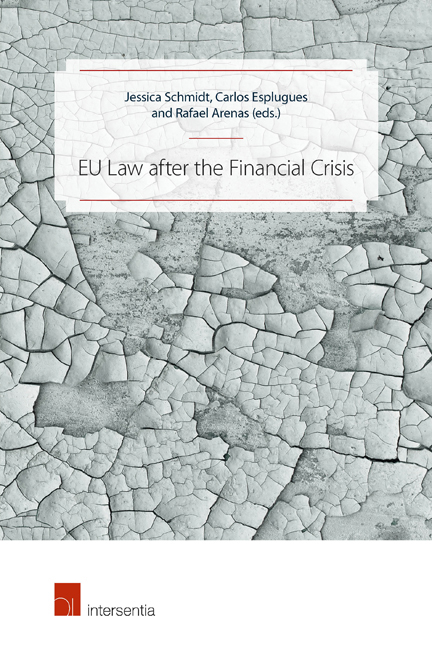Book contents
- Frontmatter
- Contents
- List of Abbreviations
- List of Authors
- Introduction
- PART I RESCUE MECHANISMS AND MONETARY POLICY
- PART II THE IMPACT OF THE FINANCIAL CRISIS ON THE BANKING SECTOR AND CAPITAL MARKETS
- PART III THE FINANCIAL CRISIS AND TAX LAW
- PART IV THE FINANCIAL CRISIS, CONSUMERS AND CONSUMER LAW
- PART V THE FINANCIAL CRISIS AND COMPETITION LAW
- PART VI THE FINANCIAL CRISIS, RESTRUCTURING AND INSOLVENCY LAW
- PART VII THE SOCIAL DIMENSION OF THE FINANCIAL CRISIS AND EU CITIZENSHIP
- PART VIII REFLECTIONS ON THE IMPACT OF THE FINANCIAL CRISIS ON THE GENERAL EUROPEAN LEGAL FRAMEWORK AND THE FUNDAMENTAL “EUROPEAN IDEA”
- Legal Certainty after the Crisis. The Limits of European Legal Imagination
- The New Role of Judges in the EU. Going Back to the Middle Ages
- Exploring the European Crisis's Political Discourse. Europe as a Consciousness, Europe as a Narrative
Legal Certainty after the Crisis. The Limits of European Legal Imagination
from PART VIII - REFLECTIONS ON THE IMPACT OF THE FINANCIAL CRISIS ON THE GENERAL EUROPEAN LEGAL FRAMEWORK AND THE FUNDAMENTAL “EUROPEAN IDEA”
Published online by Cambridge University Press: 13 December 2017
- Frontmatter
- Contents
- List of Abbreviations
- List of Authors
- Introduction
- PART I RESCUE MECHANISMS AND MONETARY POLICY
- PART II THE IMPACT OF THE FINANCIAL CRISIS ON THE BANKING SECTOR AND CAPITAL MARKETS
- PART III THE FINANCIAL CRISIS AND TAX LAW
- PART IV THE FINANCIAL CRISIS, CONSUMERS AND CONSUMER LAW
- PART V THE FINANCIAL CRISIS AND COMPETITION LAW
- PART VI THE FINANCIAL CRISIS, RESTRUCTURING AND INSOLVENCY LAW
- PART VII THE SOCIAL DIMENSION OF THE FINANCIAL CRISIS AND EU CITIZENSHIP
- PART VIII REFLECTIONS ON THE IMPACT OF THE FINANCIAL CRISIS ON THE GENERAL EUROPEAN LEGAL FRAMEWORK AND THE FUNDAMENTAL “EUROPEAN IDEA”
- Legal Certainty after the Crisis. The Limits of European Legal Imagination
- The New Role of Judges in the EU. Going Back to the Middle Ages
- Exploring the European Crisis's Political Discourse. Europe as a Consciousness, Europe as a Narrative
Summary
THE NEW PARAMETERS OF LEGAL CERTAINTY AFTER 2007
The question of legal certainty was relatively stable in EU law before 2007. It was a general principle of EC law, operating mostly in certain legal domains, and mainly through the lens of the protection of legitimate expectations. This does not mean that it was a trouble-free issue. Legal certainty as such is a convoluted notion because of its multiple components, some of them very close to the foundations of a legal order since they are clearly connected to the rule of law and fundamental rights. Legal certainty thus requires rules to be clear and precise, but also involves predictability in both legislation and adjudication. Finally it seeks substantive acceptability of concrete legal decisions as well.
However, it is submitted here that three different aspects have changed over the years that have transformed the parameters within which legal certainty operates in EU law: the potential impact that the entry into force of the Lisbon Treaty may have had on that general principle (section 1.1); the enlargement of the scope of legal certainty because of the legal weaknesses involved in the EU response to the crisis (section 1.2) and, finally, the relevance of emergency law for legal certainty and legitimate expectations (section 1.3).
THE IMPACT OF THE TREATY OF LISBON ON LEGAL CERTAINTY
The entry into force of the Lisbon Treaty in 2009 runs parallel to the outbreak and evolution of the financial and economic crisis. These new rules governing the EU have as such remained unchanged, except for the slight modification of Article 136 TFEU, which some have even deemed useless in line with the Pringle ruling.
This Treaty has had a major impact on legal certainty in two particular ways. In the first place, it has led to its partial codification and therefore legal certainty no longer works in EU law only as a general principle. Thus, we need to evaluate whether or not this major formal change should be reflected in our understanding of legal certainty itself.
- Type
- Chapter
- Information
- EU Law after the Financial Crisis , pp. 279 - 300Publisher: IntersentiaPrint publication year: 2016



